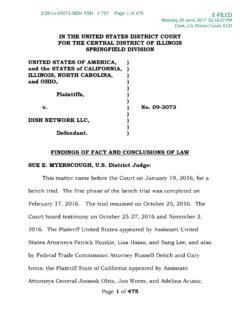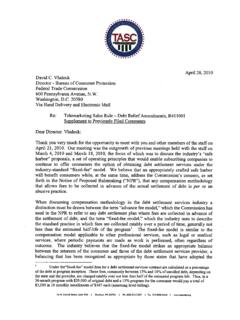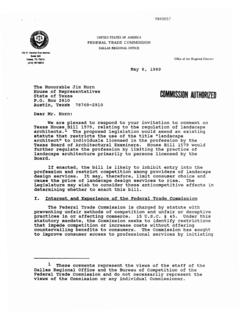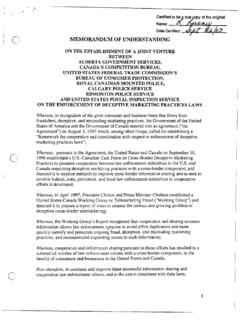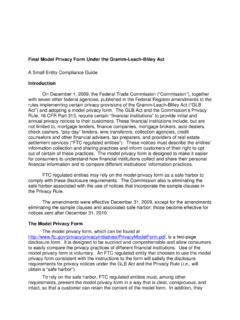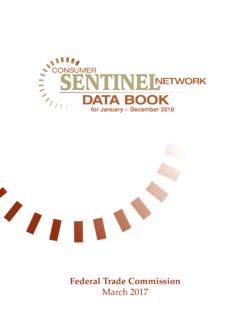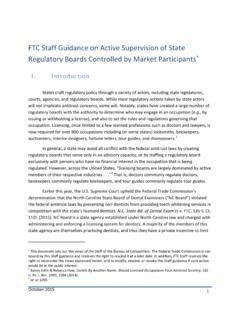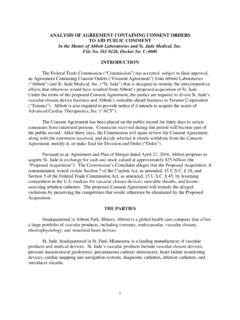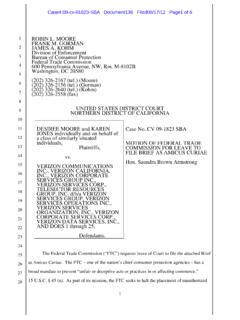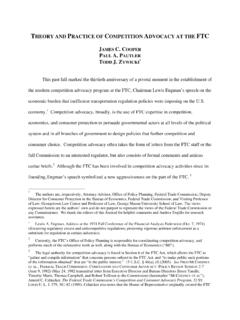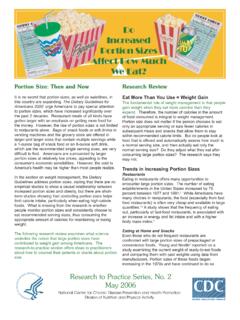Transcription of Data Brokers: A Call For Transparency and Accountability ...
1 Federal Trade CommissionMay 2014 DATABROKERSA Call for Transparency and AccountabilityData Brokers A Call for Transparency and AccountabilityMay 2014 Federal Trade CommissionEdith Ramirez, ChairwomanJulie Brill, CommissionerMaureen K. Ohlhausen, CommissionerJoshua D. Wright, CommissionerTerrell McSweeny, CommissionerTaBle of ConTenTseXeCUTIVe sUMMaRY ..iI . InTRoDUCTIon ..1A. Background ..1B. The Commission s Past Efforts to Improve Transparency of Data Broker Practices ..4C. Data Broker Study ..7II . DaTa aCQUIsITIon ..11A. Sources of Data ..111. Government Sources ..112. Publicly Available Sources, Including Social Media, Blogs, and the Internet ..133. Commercial Data Sources ..13B. Assessing Sources ..16C. Contracts with Sources ..16D. Collection Methods ..17E. Data Updates ..18 III . DeVeloPMenT of PRoDUCTs ..19A. Creation of Data Elements and Segments.
2 19B. Data Suppression ..21C. Data Storage ..22IV . TYPes of PRoDUCTs ..23A. Marketing ..231. Direct Marketing ..232. Online Marketing ..263. Marketing Analytics ..31B. Risk Mitigation ..321. Identity Verification..322. Fraud Detection ..33C. People Search ..34V . DaTa QUalITY ..36A. Marketing Products ..36B. Risk Mitigation Products ..37C. People Search Products ..38VI . ClIenTs ..39A. Types of Clients ..39B. Client Screening, Contracting, and Monitoring Practices ..40 VII . ConsUMeR ConTRols oVeR DaTa BRoKeR InfoRMaTIon ..42A. Marketing Products ..42B. Risk Mitigation Products ..43C. People Search Products ..44 VIII . fInDInGs anD ReCoMMenDaTIons ..46A. Findings ..461. Characteristics of the Industry ..462. Benefits and Risks ..473. Consumer Choice ..49B. Legislative Recommendations ..491. Marketing Products ..502. Risk Mitigation Products.
3 533. People Search Products ..54C. Best Practice Recommendations ..54IX . ConClUsIon ..57aPPenDIX a: Text of the Model order ..a-1aPPenDIX B: Illustrative list of Data elements and segments ..B-1aPPenDIX C: Concurring statement of Commissioner Julie Brill ..C-1list of exhibitsExhibit 1: Data Collection Online & Offline ..2 Exhibit 2: Data Sources ..15 Exhibit 3: Revenue of Nine Data Brokers by Product Category ..23 Exhibit 4: Onboarding ..30 Exhibit 5: Clients by Product Type and Industry Sector ..39 Data Brokers: A Call for Transparency and AccountabilityeXeCUTIVe sUMMaRYIn today s economy, Big Data is big business. Data brokers companies that collect consumers personal information and resell or share that information with others are important participants in this Big Data economy. In this report, the Federal Trade Commission ( FTC or Commission ) discusses the results of an in-depth study of nine data brokers.
4 These data brokers collect personal information about consumers from a wide range of sources and provide it for a variety of purposes, including verifying an individual s identity, marketing products, and detecting fraud. Because these companies generally never interact with consumers, consumers are often unaware of their existence, much less the variety of practices in which they engage. By reporting on the data collection and use practices of these nine data brokers, which represent a cross-section of the industry, this report attempts to shed light on the data broker industry and its practices. For decades, policymakers have expressed concerns about the lack of Transparency of companies that buy and sell consumer data without direct consumer interaction. Indeed, the lack of Transparency among companies providing consumer data for credit and other eligibility determinations led to the adoption of the Fair Credit Reporting Act ( FCRA ), a statute the Commission has enforced since its enactment in 1970.
5 The FCRA covers the provision of consumer data by consumer reporting agencies where it is used or expected to be used for decisions about credit, employment, insurance, housing, and similar eligibility determinations; it generally does not cover the sale of consumer data for marketing and other purposes. While the Commission has vigorously enforced the FCRA,1 since the late 1990s it has also been active in examining the practices of data brokers that fall outside the recently, in its 2012 report Protecting Consumer Privacy in an Era of Rapid Change: Recommendations for Businesses and Policymakers ( Privacy Report ),2 the Commission specifically addressed the subject of data brokers. The Commission described three different categories of data brokers: (1) entities subject to the FCRA; (2) entities that maintain data for marketing purposes; and (3) non-FCRA covered entities that maintain data for non-marketing purposes that fall outside of the FCRA, such as to detect fraud or locate The Commission noted that, while the FCRA addresses a number of critical Transparency issues associated with companies that sell data for credit, employment, and insurance purposes, data brokers within the other two categories remain opaque.
6 In the report, the Commission recommended 1 The Commission has brought 100 FCRA enforcement actions resulting in over $30 million in penalties. See What Information Do Data Brokers Have on Consumers, and How Do They Use It? Before the S. Comm. on Commerce, Sci., & Transp., 113th Cong. (2013) (statement of Jessica Rich, Director of the Bureau of Consumer Protection, Fed. Trade Comm n), available at Fed. Trade Comm n, Protecting Consumer Privacy in an Era of Rapid Change: Recommendations for Businesses and Policymakers (2012), available at Commissioners Ohlhausen and Wright were not members of the Commission at that time and thus did not offer any opinion on that Id. at Trade Commissionlegislation in this area to improve the Transparency of industry Following the Privacy Report, the Commission determined that, despite some progress, too little was still known about the practices of data brokers and that further examination was needed.
7 To further the objective of increased Transparency , in December 2012, the Commission initiated a study of data broker practices. It issued identical Orders to File Special Reports ( Orders ) under section 6(b) of the Federal Trade Commission Act5 to nine data brokers seeking information about their data collection and use practices, as well as any tools provided to consumers to control these practices. Appendix A is a copy of the text of the Orders that the Commission issued to the data brokers. The nine data brokers that received the Orders are Acxiom, Corelogic, Datalogix, eBureau, ID Analytics, Intelius, PeekYou, Rapleaf, and Recorded Future. The Orders requested detailed information regarding the data brokers practices, including the nature and sources of consumer data they collect; how they use, maintain, and disseminate the data; and the extent to which the data brokers allow consumers to access and correct data about them or to opt out of having their personal information sold or shared.
8 This report summarizes the information provided in response to the Commission s Orders, including information gathered through follow-up questions and meetings and publicly available sources. In general, the data brokers collect information about consumers from a wide variety of commercial, government, and other publicly available sources. In developing their products, the data brokers use not only the raw data they obtain from these sources, such as a person s name, address, home ownership status, or age, but also certain derived data, which they infer about consumers. For example, a data broker might infer that an individual with a boating license has an interest in boating, that a consumer has a technology interest based on the purchase of a Wired magazine subscription, or that a consumer who has bought two Ford cars has loyalty to that brand.
9 The data brokers use this actual and derived data to create three main kinds of products for clients in a wide variety of industries: marketing products, risk mitigation products, and people search products. Marketing ProductsFive of the data brokers studied sell marketing products, which assist clients in a variety of ways. For example, businesses can purchase their customers email addresses from data brokers so that they can send email solicitations to them. They can also purchase information about their customers interests in order to market specific products to them, including using consumers offline activities to determine what advertisements to serve them on the Internet. The data brokers also sell analytics products. For instance, some data brokers analyze their client s customer data and suggest the media channel to use to advertise a particular product ( , online or newspapers) and/or the geographic region where the advertisements 4 Id.
10 At 15 46(b). See also Appendix Brokers: A Call for Transparency and Accountabilityshould be shown. A few data brokers also convert their analyses into marketing scores that, for example, rank clients customers on the basis of how likely they are to respond to particular marketing efforts or to make a purchase, their presence on the web or their influence over others, or other of the data brokers that sell marketing products provide consumers with limited access to some, but not all, of the actual and derived data the data brokers have about them. Only two of the data brokers allow consumers to correct their personal information for marketing purposes, and four of the five data brokers that sell marketing products allow consumers to opt out of the use of their personal information for marketing purposes. However, it is not clear how consumers would learn about these rights; for example, no centralized portal currently exists for consumers to learn about data brokers and what access rights and choices they Mitigation ProductsFour of the data brokers studied sell risk mitigation products, which clients use to verify their customers identities or detect fraud.
